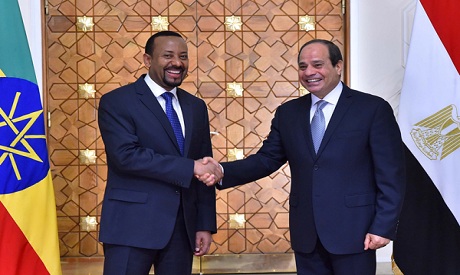
Egyptian President Abdel-Fattah el-Sisi (R), shakes hands with Ethiopian Prime Minister Abiy Ahmed, in Cairo, Egypt on Sunday 10 June, 2018 (Photo: AP)
A nine-party meeting comprising the foreign affairs and irrigation ministers and the heads of intelligence of Sudan, Ethiopia and Egypt scheduled to begin on 18 June has been postponed, putting a damper on optimism generated by the visit to Cairo of Ethiopian Prime Minister Abiy Ahmed earlier this month.
Ahmed’s visit had been widely viewed as positive. “We will never harm the people of Egypt”, he said in a joint press conference with President Abdel-Fattah Al-Sisi at the end of his two-day visit.
“What I want to tell the people of Egypt is that we Ethiopians know the value of the spirit of brotherhood… we are God-fearing people and we will never harm the people of Egypt.”
The visit was described by commentators as amicable. Al-Sisi and Ahmed agreed to work closely on a host of bilateral issues, including resolving outstanding differences over the Renaissance Dam.
Ahmed’s predecessor Hailemariam Desalegn delivered similar promises during his visit to Egypt as prime minister in January.
“The people of Ethiopia will never subject Egyptians to danger. We will not hurt your country in any way and will work closely together to secure the life of the peoples of the Nile Basin and take them out of the cycle of poverty,” he had said.
Ahmed’s visit, according to Mohamed Hegazi, a former assistant to Egypt’s foreign minister, was timely, and could have helped follow up on the second nine-party meeting held in Addis Ababa last month.
“Strong relations with countries like Egypt could help the Ethiopian economy and make the region much more stable. The Nile water issue can be a reason for cooperation and not a source of conflict,” he said.
Hegazi still maintains a degree of optimism. “The technical meeting was supposed to be held a week after the three countries received a report from the French consultancy firm. Given the report has not yet been submitted the meeting had to be postponed,” he points out.
Mohamed Ezzeddin, an expert on African affairs, described Ethiopia’s new prime minister as open-minded and possessed of political vision.
“Political change in Ethiopia points to the possibility of wider cooperation, not only with Egypt but with Sudan and across the Horn of Africa,” he argues.
During his visit Ahmed secured the release of 32 Ethiopian prisoners held in Egypt and promises Egyptian officials would locate the bodies of 38 Ethiopians killed by Islamic State in Libya in 2015.
Al-Sisi and Ahmed met less than three weeks after the second nine-party meeting agreed to discuss mechanisms for further cooperation and fix the dates for future meetings. Steps that were agreed, however, have yet to be taken.
According to the document signed by the three countries at the nine-party meeting, the chairman of the National Technical Committee (NTC) was required to make Sudan and Ethiopia’s observations on the preliminary report available to the consultancy firm so it could reply to the observations within three weeks.
The reply was then to be discussed at the ministerial meeting due to be held back-to-back with the third nine-party meeting which was postponed.
The second nine-way meeting also saw ministers agree to bring together senior officials from the three countries in order to identify joint infrastructure and development projects, with Egypt scheduled to host a meeting to discuss the outcome of the officials’ talks on 3 July in Cairo, and form a new scientific research committee to develop possible scenarios for the filling of the dam’s reservoir and its operation.
The filling time and operating protocols are of special concern to Egypt since Cairo fears any reduction in the Nile’s flow. During their meeting Al-Sisi and Ahmed agreed to start negotiations on the filling process.
Disagreement over the preliminary report and the filling time and operating process of the dam stymied the first nine-party meeting held in Khartoum in April.
Ezzeddin says a compromise on the question of filling the reservoir is imminent, believing it is likely “Ethiopia will accept the application of international standards which will stagger the filling over seven to 10 years.”
Ethiopia began work on the dam in 2011. Egypt has repeatedly expressed its concerns that the dam will reduce its 55.5 billion cubic metre share of Nile water enshrined in the 1929 and 1959 Nile Water agreements.
Egypt’s per-capita supply of water is expected to drop from 663 cubic metres per year to 582 cubic metres by 2025, according to the Central Agency for Public Mobilisation and Statistics (CAPMAS).
Ethiopia insists the dam is being constructed mainly to generate electricity, and claims it is necessary for Ethiopia’s development and says it will not harm downstream countries.
Addis Ababa plans to start filling the reservoir some time this year. When completed the Grand Ethiopian Renaissance Dam will be the largest in Africa, with a reservoir capacity of 74 billion cubic metres.
*A version of this article appears in print in the 21 June 2018 edition of Al-Ahram Weekly under the headline: The shape of water
Short link: